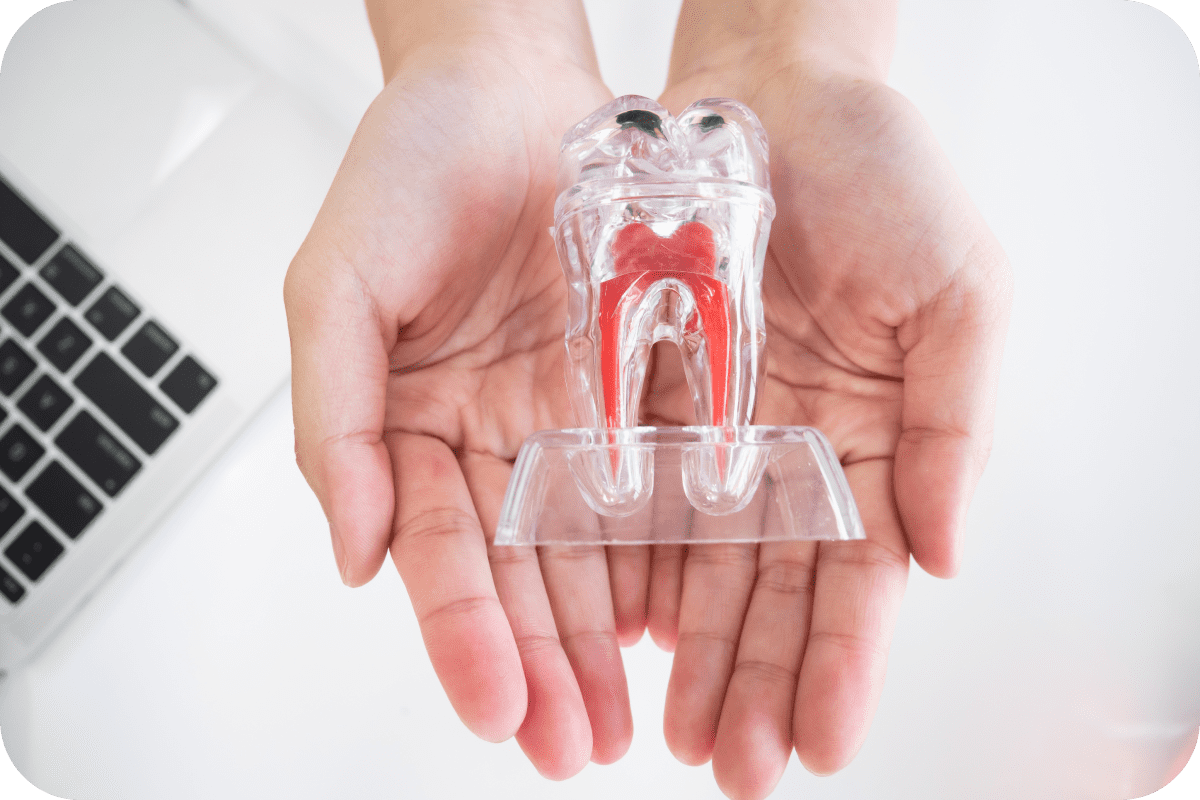Root Canal Treatment
Root canal treatment is a dental procedure that aims to treat infections or damage inside a tooth in order to save the damaged tooth and prevent extraction. The root of a tooth contains the pulp chamber, which consists of dental pulp tissue, blood vessels, and nerves. When a tooth is affected by deep decay, cracks, fractures, or other types of damage, bacteria can enter the root and cause an infection. When patients experience discomfort in their teeth, dentists often recommend taking X-rays to identify the cause of the discomfort and determine if root canal treatment is necessary. Our dental team will provide patients with the most professional treatment options or recommendations. Feel free to schedule a consultation to receive expert advice and discuss the appropriate treatment plan for your dental needs.


Root canal treatment is a common dental procedure used to treat infected, damaged, or decayed tooth roots. This condition often occurs when bacteria enter the central part of the tooth, known as the pulp chamber, due to tooth decay or trauma. Without treatment, bacteria can continue to spread, causing pain, infection, and the risk of tooth loss. The process of root canal treatment typically involves multiple steps.
Firstly, the area around the tooth will be numbed to ensure the patient is pain-free throughout the procedure. Then, the top of the tooth will be opened to allow the dentist to access the root. Next, the dentist will carefully remove the damaged tissue, infection, and nerves from the pulp chamber using specialized tools called root canal files. The root canal will then be cleaned, enlarged, and shaped to prepare it for filling. Once the root canal is cleaned and enlarged, the dentist will use a filling material, typically a resin material, to fill the root canal. This helps prevent bacteria from re-entering the root and causing reinfection.
After root canal treatment, the tooth can be preserved in the mouth, avoiding extraction. Finally, the tooth may require further restoration, such as the placement of a dental crown, to restore function and appearance. This helps protect the tooth and allows for normal chewing of food.
Post-treatment care is crucial for ensuring long-term dental health and the success of root canal treatment.
Here are some recommendations for post-root canal treatment care:
- Good oral hygiene habits: Maintain regular brushing, flossing, and mouthwash use to keep your mouth clean. Schedule regular dental check-up and cleaning.
- Avoid chewing on hard objects: Refrain from biting on hard foods to prevent excessive pressure on the treated tooth, which can lead to fractures or damage.
- Seek timely dental care: If you experience any abnormalities such as pain, swelling, infection, or tooth sensitivity, seek prompt dental attention for examination and necessary treatment.
- Regular follow-up examinations: Schedule regular follow-up appointments to ensure the continued success of the root canal treatment. Your dentist can assess the condition of the treated root canal and make any necessary adjustments or repairs.
Check up
$100
Cleaning (Included check up)
$500 (CSW)
$600 (Ma On Shan & SWH)
Filling
$600-$800
Filling (Front tooth)
$600-$1000
Extraction
$600-$800
Extraction (Baby tooth)
$500
Surgical Extraction (Retain root, Fracture, Root Canal Treatment tooth)
$3500 up
Root Canal Treatment tooth
Anterior
$4500-$5000
Premolar
$4500-$5000
Molar
$5500-$6000
Baby tooth
$4500
Medication (3 days)
$300
Drug prescription (per day)
$100
Chlorhexidine
$100
***Extraction and Root Canal Treatment are including local anesthesia and medication***
Intra oral x ray
$100
Panoramic radiograph
$300
CT Scan (per arch)
$1500
F&Q
Root canal treatment is typically performed to treat infections or significant damage within a tooth. When the nerve tissue of a tooth becomes infected by bacteria or experiences severe damage, it can cause intense pain and swelling. Root canal treatment can save the tooth, prevent the spread of infection, and restore biting function.
During root canal treatment, the dentist administers local anesthesia to ensure comfort during the procedure. Most patients do not feel pain during root canal treatment but may experience mild discomfort or pressure. In the days following the treatment, there may be some slight soreness, which can be alleviated with appropriate pain medication.
Root canal treatment can save a damaged tooth and restore its normal function. Once the root canal treatment is completed and appropriate restoration is performed, your tooth should be able to chew and bite food normally, functioning alongside other teeth.
Root canal treatment is a common and safe dental procedure. Before performing the treatment, the dentist conducts a thorough evaluation and diagnosis to ensure that root canal treatment is suitable for the patient's condition. However, occasional treatment failures or complications such as infection or periapical cysts may arise, which can be addressed under the supervision of a professional dentist.
In some cases, root canal treatment may not be the only option. Depending on the condition and severity of the tooth, there may be other alternatives such as tooth extraction followed by dental implants or partial dentures. However, root canal treatment is typically the best choice for preserving the natural tooth and restoring its function. It is important to discuss the expected outcomes and potential risks of root canal treatment with your dentist before considering other options.
